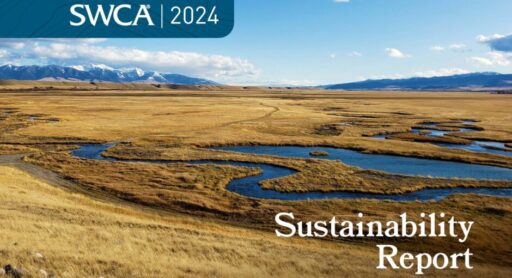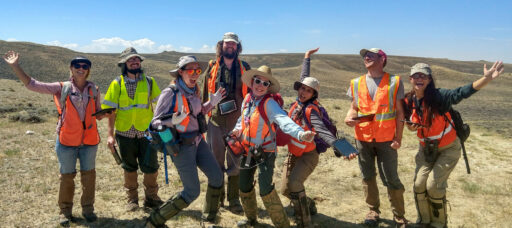2025
Comparably’s Best Company Outlook
* Providing engineering services in these locations through SWCA Environmental Consulting & Engineering, Inc., an affiliate of SWCA.

From the experts we hire, to the clients we partner with, our greatest opportunity for success lies in our ability to bring the best team together for every project.
That’s why:

At SWCA, sustainability means balancing humanity’s social, economic, and environmental needs to provide a healthy planet for future generations.

SWCA employs smart, talented, problem-solvers dedicated to our purpose of preserving natural and cultural resources for tomorrow while enabling projects that benefit people today.

At SWCA, you’re not just an employee. You’re an owner. Everyone you work with has a stake in your success, so your hard work pays off – for the clients, for the company, and for your retirement goals.
MBTA Revocation Rule in Effect December 3, 2021
Amanda Glen is SWCA’s natural resources technical director for biological services and provides strategic guidance on permitting and compliance for matters involving protected wildlife, plants, and habitats. Currently managing a national practice, she has more than 25 years of consulting experience with an emphasis on the Endangered Species Act (ESA) and how compliance with the ESA influences other regulatory programs. Her wealth of experience pertaining to endangered species issues includes research, permitting, consultations, status reviews, and conservation planning. Her experience includes negotiating compliance solutions for critically imperiled species facing potential determinations of jeopardy or adverse modification of designated critical habitats. She has led efforts to delist species no longer requiring the protections of the ESA when supported by sound science, and has been involved in voluntary conservation planning to help preclude the need to list species. Amanda frequently presents at regional and national conferences on matters related to the ESA, including new listings, regulatory and policy changes, and trends in compliance strategies.

Doug has 25 years of biology and ornithology experience in the southern and western United States, Costa Rica, and Mexico, and is recognized as a regional expert in field ornithology. He also is the lead biologist for bat monitoring projects in SWCA’s Rocky Mountains and Plains region. He conducts field surveys, performs desktop review of scientific literature, and consults with agency resource specialists to address impacts on biological resources considered in National Environmental Policy Act (NEPA) documents. With general and specific knowledge of natural history across multiple tax and competence in local, state, and federal regulations pertaining to wildlife conservation and management, Doug advises on environmental study design and analysis, and peer reviews technical reports. He is published in peer-reviewed journals and is currently an associate editor of the peer-reviewed regional journal Western Birds.



Starting December 3, 2021, the U.S. Fish and Wildlife Service (FWS) will revert to interpreting incidental take under the Migratory Bird Treaty Act (MBTA) as it did prior to the Trump Administration’s Jorjani Opinion. The Jorjani Opinion concluded that prohibition of incidental take applied only to direct and purposeful actions that resulted in loss of protected migratory birds, eggs, or their nests. On January 7, 2021, in the midnight hour of the Trump Administration, the FWS published a final rule defining the scope of the MBTA as interpreted in the Jorjani Opinion.
The FWS under the Biden Administration has revoked the January 7 final rule with the intent “to return to implementing the MBTA as prohibiting incidental take and applying enforcement discretion, consistent with judicial precedent and longstanding agency practice prior to 2017.” The FWS has also published a Director’s Order clarifying its current enforcement position.
According to the Director’s Order, the FWS’s intention “through this policy is to apply a transparent and consistent approach to managing and prioritizing our enforcement of incidental take, taking into account the case law applicable in a given jurisdiction and the facts and circumstances of each case.”
Therefore, it is important to understand the current scope of MBTA prohibitions will depend on your project’s location. For instance, the Courts of Appeals for the Fifth, Eighth, and Ninth federal district circuits have ruled that the MBTA does not prohibit incidental take; these circuits cover many of the western and central states.
The saga doesn’t end here! Because of the legal discrepancy among the circuit courts, the FWS intends to introduce new policies. These new policies may codify an interpretation of the MBTA that prohibits incidental take and a regulatory framework for the issuance of permits to authorize incidental take.
For updates or additional information, please reach out to your primary SWCA contact.